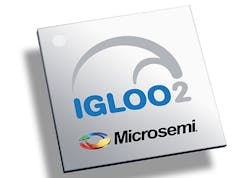Small-form-factor FPGAs for military, automotive, and industrial uses introduced by Microsemi
The non-volatile configuration of these two FPGAs eliminates the need for external configuration memories to reduce the device size. Microsemi's mainstream flash-based FPGAs inherently reduce board space requirements.
Microsemi's portfolio of flash-based programmable logic devices includes small-form-factor packages include devices that measure 11 by 11, 14 by 14, 19 by 19, and 22 by 22 millimeters.
For example, the SPI flash required to configure a 90K LE SRAM-based FPGA can consume about 100 square millimeters of additional board real estate, which is about the entire area the M2S090 device occupies in an 11-by-11-millimeter package.
Related: NASA Langley scientists choose space-qualified FPGAs from Microsemi for spacecraft research
Microsemi introduced the small-form-factor FPGAs due to "increased customer demand for reliable, secure, and small footprint SoC FPGAs and FPGA solutions," says Tim Morin, director of marketing at Microsemi.
Microsemi's SmartFusion2 SoC FPGAs are for security, high reliability and low power in critical communications, industrial, defense, aviation and medical applications. SmartFusion2 integrates flash-based FPGA fabric, a 166 megahertz (MHz) ARM Cortex-M3 processor, advanced security processing accelerators, DSP blocks, SRAM, eNVM and industry-required high performance communication interfaces, all on one chip.
Related: Avionics: ahead of the curve
Microsemi's IGLOO2 FPGAs are for cost-optimized FPGA applications. These devices have a LUT based fabric, 5G transceivers, high speed GPIO, block RAM, a high-performance memory subsystem, and DSP blocks in a differentiated, cost and power optimized architecture.
For more information contact Microsemi online at www.microsemi.com.
